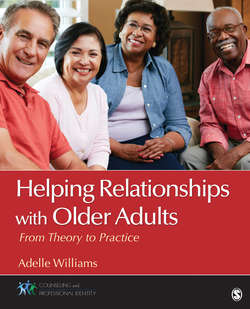Читать книгу Helping Relationships With Older Adults - Adelle M. Williams - Страница 17
На сайте Литреса книга снята с продажи.
Neuroendocrine Theory
ОглавлениеThe neuroendocrine theory of aging focuses on the neuroendocrine system, which is a complicated network of biochemicals that govern the release of hormones altered by the hypothalamus located in the brain. The hypothalamus controls various chain reactions to instruct other organs and glands to release their hormones. The hypothalamus also responds to the body hormone levels as a guide to the overall normal activity, and as we grow older, the hypothalamus loses its precision regulatory ability, and the receptors that uptake individual hormones become less sensitive to them. Additionally, as we age, the secretion of many hormones decline, and their effectiveness is also reduced (Ramaswamy, 2012). As the body ages, it produces lower levels of hormones that are vital for well-being. Dehydroepiandrosterone (DHEA) is a hormone that comes from the adrenal gland and also made in the brain. DHEA leads to the production of male and female sex hormones. DHEA levels begin to decrease after age 30 and levels decrease more quickly in women. Lower DHEA levels are found in people with hormonal disorders, HIV/AIDS, Alzheimer’s disease, heart disease, depression, diabetes inflammation, immune disorders, and osteoporosis (Mayo Clinic, 2015). DHEA may cause side effects related to other hormones, and women may experience symptoms such as increased unnatural hair growth and deep voice, and men may experience urinary urgency and aggression, among other symptoms. Other side effects that may occur in either sex include sleep problems, headache, nausea, skin itching, and mood changes; and DHEA may affect levels of other hormones such as insulin (hormone that controls the glucose levels in the blood) (Mayo Clinic, 2015). Melatonin is another hormone and has been called the antistress hormone due to its ability to regulate rhythms of other hormones and its ability to blunt the negative effects of cortisol. Cortisol is a hormone that regulates a wide range of processes throughout the body including metabolism and the immune response. It also has a very important role in helping the body respond to stress; however, when cortisol levels are elevated longer than normal, it contributes to illnesses and diseases because cortisol is considered the stress hormone when it is elevated. A decline in human growth hormone results in changes in body composition. Lean body mass shrinks, and there is an increase in adipose (fatty) tissue. This loss of lean body mass leads to atrophy, or wasting away, of skin, skeletal muscle, and bone. Decreased levels of human growth hormone can also lead to elevated cholesterol levels (Park et al., 2011).
The neuroendocrine theory proposes that the most effective approaches to delay (and even reverse) the aging process and ameliorate the diseases of aging is to restore hypothalamic (and peripheral) receptor sensitivity, restore hormone levels to more youthful values by hormone replacement therapy, prevent damage effects of hormones, and restore intracellular bioenergetics (energy transfers in living cells). This theory explains the cause of major diseases of aging, which contribute to over 85% of deaths and disabilities of middle-aged and elderly individuals. These diseases include obesity, atherosclerosis, hypertension, diabetes, and cancer among others (Dean, 2012).
